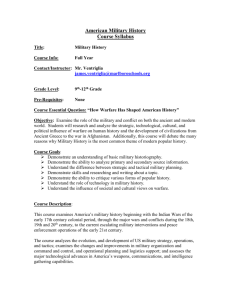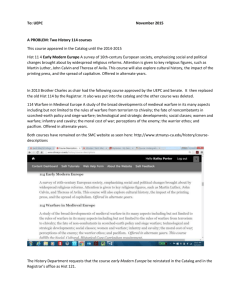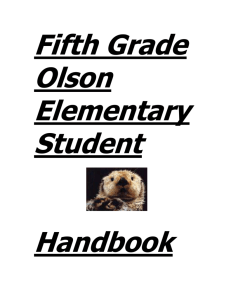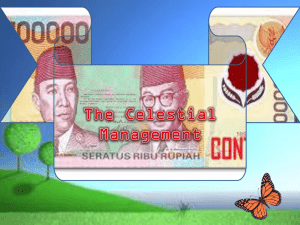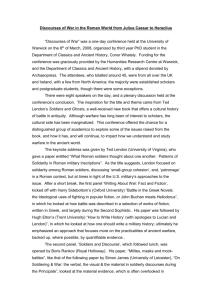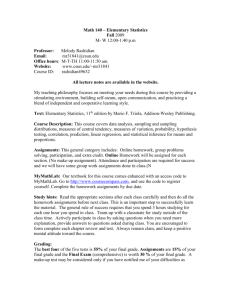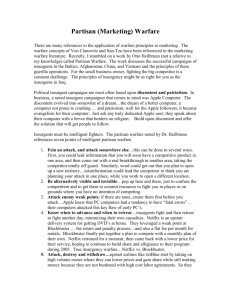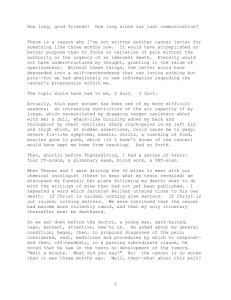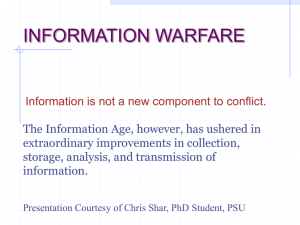Course Syllabus: Military History - Pc|mac
advertisement
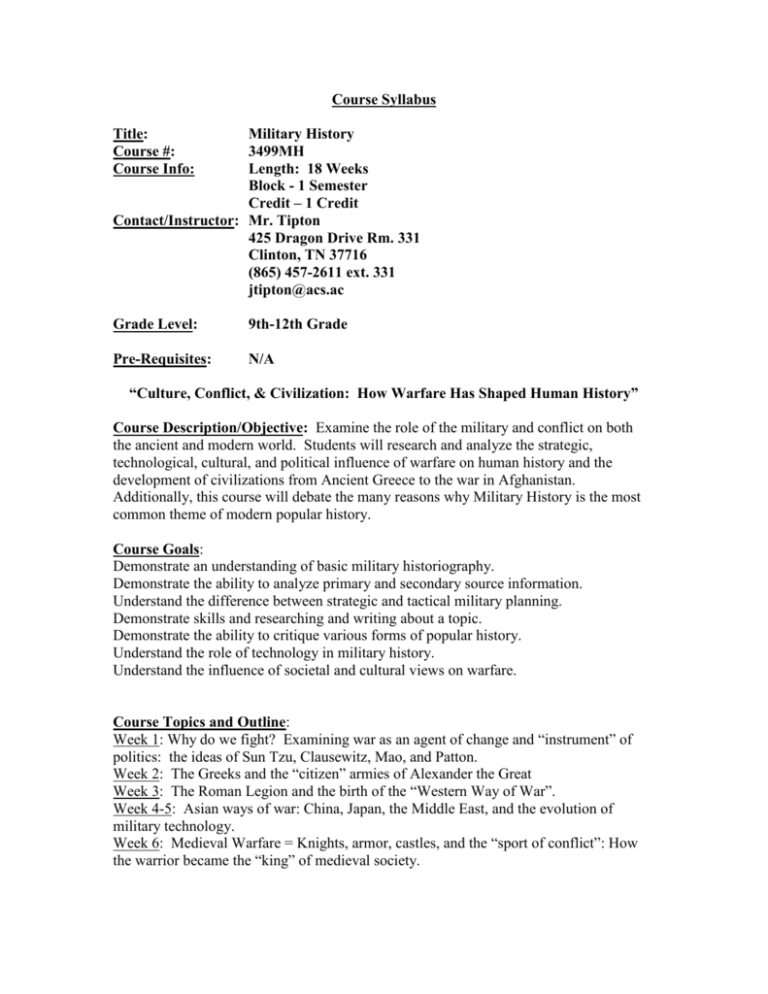
Course Syllabus Title: Course #: Course Info: Military History 3499MH Length: 18 Weeks Block - 1 Semester Credit – 1 Credit Contact/Instructor: Mr. Tipton 425 Dragon Drive Rm. 331 Clinton, TN 37716 (865) 457-2611 ext. 331 jtipton@acs.ac Grade Level: 9th-12th Grade Pre-Requisites: N/A “Culture, Conflict, & Civilization: How Warfare Has Shaped Human History” Course Description/Objective: Examine the role of the military and conflict on both the ancient and modern world. Students will research and analyze the strategic, technological, cultural, and political influence of warfare on human history and the development of civilizations from Ancient Greece to the war in Afghanistan. Additionally, this course will debate the many reasons why Military History is the most common theme of modern popular history. Course Goals: Demonstrate an understanding of basic military historiography. Demonstrate the ability to analyze primary and secondary source information. Understand the difference between strategic and tactical military planning. Demonstrate skills and researching and writing about a topic. Demonstrate the ability to critique various forms of popular history. Understand the role of technology in military history. Understand the influence of societal and cultural views on warfare. Course Topics and Outline: Week 1: Why do we fight? Examining war as an agent of change and “instrument” of politics: the ideas of Sun Tzu, Clausewitz, Mao, and Patton. Week 2: The Greeks and the “citizen” armies of Alexander the Great Week 3: The Roman Legion and the birth of the “Western Way of War”. Week 4-5: Asian ways of war: China, Japan, the Middle East, and the evolution of military technology. Week 6: Medieval Warfare = Knights, armor, castles, and the “sport of conflict”: How the warrior became the “king” of medieval society. Week 7: Imperial Military History: The Renaissance and the race for Empires in Europe: Examining European ways of war vs. Native ways of war. Week 8-9: “The American Way of War”: How American military history created the modern world, and conflict between Indians and white settlers led to the development of “guerrilla” warfare in the New World. Week 10: David vs. Goliath: The American Revolution and War of 1812. Week 11: The American Civil War = Total War. Week 12-13: The Great War and the influence of the “American Way of War” on the 20th century world. Week 14-15: The American Experience in WWII: The fall of Imperial Japan and Nazi Germany and the rise of nuclear power. Week 16-17: Confused Conficts: Korea, Vietnam, and their influence on the relationship between the Army and the American psyche and society. Week 18: American Military Practice in the Present: 4GW (Fourth Generation Warfare) Texts: (All primary and secondary source material will be provided in class) American Military History, U.S. Army Center of Military History (1969) The American Way of War: A History of the United States Military Strategy and Policy, Russell F. Weigley (1973) Art of War, Sun Tzu (approx. 500 B.C) The Art of War (1936) and On Guerrilla Warfare (1937), Mao Tse-tung Battle: A History of Combat and Culture, John A. Lynn (2003) The Best War Ever: America and World War II, Michael C.C. Adams (1994) Carnage and Culture: Landmark Battles in the Rise of Western Power, Victor Davis Hanson (2001) The First Way of War: American War Making on the Frontier, John Grenier (2005) Makers of Modern Strategy: From Machiavelli to the Nuclear Age, Peter Paret (1986) The Patton Mind, Roger H. Nye (1993) On War, Carl Von Clausewitz (1832) Assignments/Grading: Student grades in this course will be determined as follows: Daily Assignments/Research Portfolio: 15% Mid-term Exam: 10% Final Exam: 10% Discussion Responses/Class Reflections: 15% Source Critique (3-5 pages):15% Film Critique (3-5 pages): 15% Final Research Paper/Project: 20% Grading Scale: 93-100 = A 85-92 = B 75-84 = C 70-74 = D Below 70 = Incomplete Make-up/Late Assignment Policy: Students are responsible for turning in all assignments on time and completed. If a student has missed an assignment due to absences, extra-curricular activities, etc., they must ask for their make-up work on the following class day. Late assignments and makeup work must be turned in within 1 week of the original due date. Any students who fail to turn in make-up work or late assignments will receive an Incomplete in the course until all work has been submitted. FAILURE IS NOT AN OPTION. Classroom behavior/discipline: All students are expected to comply with the discipline standards and behavior policy of Clinton High School and Anderson County Schools. Tennessee Standards Ancient History: 9-12 1.1 understand the relationship between physical environments and culture. 2.1 understand economic connections, conflicts, and interdependence. 4.2 identify how cooperation and conflict among people influence the division and control resources, rights, and privileges. 5.1 understand the chronological flow of historical eras and events in Ancient History. 5.3 understand how historical information is collected, recorded, interpreted, transmitted, and disseminated across various historical eras. 6.1 understand the extent to which individuals, groups and institutions interact to produce continuity and change throughout world history. Contemporary Issues: 9-12 5.1 Recognize the impact of traumatic effects of destructive events on human society. Modern History: 9-12 2.2 understand the rapid change of the global economy during World War II. 3.2 identify the various theaters of war during World War II. 4.2 understand the growing importance of the United Nations for the endorsement of world political and military action. 4.3 understand the impact of terrorist actions on increased government control of its civilian populations, especially in the wake of the events of September 11, 2001. 5.1 investigate the causes, effects, and attempts to deal with worldwide depression after World War I. 5.2 understand the world events leading to World War II. 5.3 understand how to use historic information acquired from a variety of sources. 5.1 identify the causes, effects, and attempts to deal with worldwide depression after World War I. 6.1 understand the impact of individual and government decisions on citizens and communities. 6.2 understand how individual leaders can dominate groups and influence the circumstances of history. United States Government: 9-12 2.3 understand how all nations use "tools of foreign policy" such as alliances, economic aid, economic sanctions, trade agreements, propaganda, military aid, treaties, troop movements, and wars to promote national interests. 3.1 Understand and analyze how the forces of cooperation and conflict among people influence the division and control of the earth's surface United States History 1.2 Understand the effects of World War II upon American society. 2.1 Recognize how industrialization of World War I changed the United States economy. 3.1 Identify the countries involved in World War I. 3.1 Identify countries dominated and threatened by communism after World War II. 4.1 Understand the effects of the Civil War and Reconstruction on the United States politics. 5.1 Understand the role of the United States in world affairs. 5.2 Understand the causes for WWI and the reasons for America’s entry into the war. 5.2 Understand the changing dynamics of American life during World War II. 5.2 Understand the causes, the course, and the effects of the Vietnam War at home and abroad. 5.3 Investigate domestic and foreign policy trends since 1968. 6.1 Understand the effect of World War I on the American people. 8.1 Identify the causes of World War II (i.e., Treaty of Versailles, fascism, failure of the League of Nations, Japanese imperialism, economic worldwide difficulties). 8.5 Interpret a timeline of major events from World War II. 8.10 Evaluate the impact of the Manhattan Project. 9.1 Recognize differences among the victorious Allied Powers after World War II
